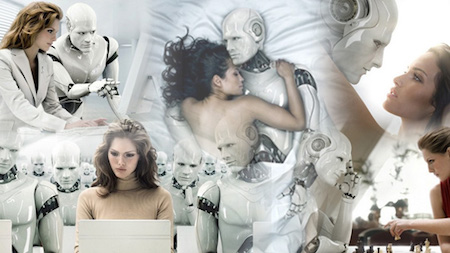 I recently came across the work of photographer Frans Steiner, obviously a man inspired by the beauty of people. Nevertheless, as the collage image of one of his series shows, obviously he is, just like me, wondering about the co-existence of humans and their evolutionary successors: intelligent artificial humanoids. The description of latter species already implies three major obstacles:
I recently came across the work of photographer Frans Steiner, obviously a man inspired by the beauty of people. Nevertheless, as the collage image of one of his series shows, obviously he is, just like me, wondering about the co-existence of humans and their evolutionary successors: intelligent artificial humanoids. The description of latter species already implies three major obstacles:
- Intelligent, they obvioulsy "think like us". At least it means that their IQ matches or exceeds human level. Future robots communicate, act and play on a level comparable to humans. It's difficult to predict if the current generations will ever acknowledge intelligence brighter than their own. Humanity can not stop the development of it because it's a technological evolution emerged a long time ago and today we already count on it with our Tesla's, Google Search, Siri and medical robots. However, discussions about the "soul" of machines will make the acceptance even more awkward because, although the concrete intelligence of a robot might be superior, their conclusions about human matters will always be questioned;
- Artificial, they are "made by us". So we have designed and produced them in our studios and factories as opposed to having them grown in the belly of another human or maybe a petri dish. Humans tend to draw a strict line between "human grown" and "human made". We obviously already have forgotten that that line is already crossed many years ago with the acceptance of all sorts of medical tricks from artificial insemination until keeping humans alive anyway, let alone the replacement of human parts from hips, lungs, hearts, eyes, ears, kidneys, limps and sooner or later connections to our cognitive skills and abilities, say artificial parts of our brain. As a deaf person, I'm following the development of cochlear implants or direct brain connections closely and for me, these "brain improvements" can not come fast enough;
- Humanoid, they "look like us". Altough human resemblance is not mandatory for an intelligent robot, it helps to blend them into human environments which are after all shaped by humans for their own convenience.
As you can see in the work of Steiner, his mind was obviously even a step further. His set-ups showed robots who "feel like us". At least as if the feelings were fully accepted by the humans around them, in day-to-day life and completely compliant as a human replacement, regarding everything.
On a phylosophical level it might be hard to accept intelligent artificial robots as a replacement for our own species but personally I believe that it's unavoidable. We already rely on lots, lots, lots of benefits from machines and the step to an artifical intelligence above human intelligence will not be noticable anyway. It will just happen. Silently. I believe that eventually humanity will accept and even embrace that step. A lot of problems we can not solve ourselves like with nuclear waste, food, water, environment and energy will be solved by the greater robot intelligence and a lot of work we don't want to do anymore will be become unnecessary or replaced by machines.
Is that a thread? At the end of the day (actually century): No!. Of course in the transition phase (which already started hundreds of years ago and will be going on for another hundred or so) jobs wil vanish and others will emerge but let's be honest, the level of labor participation will decline rapidly in the next decades. What will remain are jobs which are closely connected to humans and their human capabilities and shortcomings. Security, health, F2F-services and entertainment including sports are examples of area's with human jobs for many decades to come. Others like in production, administration and knowledge services will vaporize sooner or later.
So, what would humans do without the need for labor anymore? Well, the first things humans have to do is "flipping a mind switch". Up until today, every individual human had to survive. Hunting, farming, working were means to get food or money to buy food (and some other things) for themselves and their families. Suppose there is a world where water, food, energy and shelter is almost free because robots provide that for us. People can die from boredom or find another meaning of life after the hunting/farming/working ethos. Older generations will have some mental difficuties with it, the younger people will know what to do.
Meanwhile, happy working 